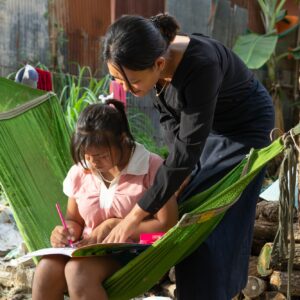As the sun rises over the rice fields in a small rural village, in Cambodia’s Kampong Speu province, 25-year-old Horm Chandy feeds and baths her 14-month-old son before she drops him over to her parents nearby so she can get to work.
Chandy typically sets off on her motorbike at 6.30am to get to the local school by 7am where she teaches morning classes to children with disabilities. Chandy teaches up to ten students from four to nine years old, all living with various disabilities such as autism and other intellectual disabilities.
Her classroom is relatively new (four years old) and was designed to specifically cater for children with disabilities thanks to a project by Aide et Action and Rabbit School Organisation aimed at integrating children with disabilities into state school and offering more inclusive education opportunities.
Approximately 80% of persons with disabilities live in developing countries where access to education is an ongoing challenge. In Cambodia, one in two disabled children are not in school compared to one in 14 non-disabled children. Throw school closures because of the Covid-19 pandemic into the mix and existing inequalities are exacerbated.
Chandy’s routine used to run like clockwork until March 2020, when Covid-19 disrupted education and everyday life, shuttering schools for six months. For Chandy’s students, the loss of a daily routine, an opportunity to socialise with others, and a structured learning environment posed real obstacles to their development. « I noticed that with many of the kids, the longer they stay at home, the less improvement there was », she says.
For the best part of 2020, Chandy had to pack up her classroom and go house-to-house to reach her students. With support from fellow teacher Phun Kanha, Chandy developed strategies to tailor-meet the children’s needs.

At first it was a bit of trial and error. Aide et Action developed online content to train parents how to teach children with disabilities at home. But with limited access to internet in rural areas and limited time available, going house to house to reach the children and their parents seems like the better route.
“I spent two days per week going to visit my students at their homes and giving them homework and exercises”, said Chandy. In some cases she explained to the parents how to teach their kids from home and encouraged them to record videos to show the development of the kids and send it to her.
“It was very difficult to teach like this … parents, while they may be trying their best and staying at home, they don’t know how to take care of the children’s education and development in the same way their teachers do in a classroom environment.”

For Chandy, the crisis led her to develop more flexible learning strategies to use with her students. “It’s been a good opportunity for me to try new technologies and develop my IT skills. With support from Aide et Action and Rabbit School Organisation, I had access to e-learning tools, and learnt how to share files on cloud systems which ! never did before”, she explains. Using video and social media has also been a new mode of communication for her with parents and others.
Before Covid-19, primary-school-age children with disabilities were more likely to be out of school than their peers without disabilities. Teachers like Chandy and Kanha play a critical role in keeping Cambodia’s most vulnerable children in education.

As we continue to endure Covid-19 and the greatest educational emergency of our time that it presents, Aide et Action will continue to support local teachers and communities to protect the most marginalised and assess where needs are greatest.
Note: We previously recognised Chandy’s work in our World Teacher’s Day 2020 post.






